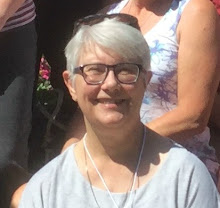The box is definitely getting emptier and it is getting more...challenging to come up with colour combinations I find pleasing in sufficient quantity. But I am nearly finished that last cone of cotton slub/linen for weft.
Today I got back to The Book and generated another 2000 or so words...and lots of drafts for examples.
People learn in different ways and a craft can be learned in various ways, too. Weaving is very linear on one level, but can also be organic. For me it breaks down into two parts: process is more linear; quality and design of cloth is more organic.
Determining appropriate quality of cloth is pretty much an exploration through trial and error, building on previous experience. The only way to gain experience is to do. As famously is said, do, or do not, there is no try.
As much as someone can explain what to do, until the student jumps in and does for themselves it is merely intellectual understanding.
That doesn't mean that intellectual understanding is meaningless, just that you need both that theoretical understanding AND the actual experience to truly know what is going to happen. Or at least know with 90% certainty, because there is always that bit of the unknown when trying something new or different.
One of the reasons I am so supportive of the Olds College program is that it is attempting to provide the linear intellectual information while encouraging the organic. The thing that seems to be most lacking in terms of learning weaving these days, imho, is that intellectual, linear information. It is one of the things I am hoping to provide in The Book, at least to an introductory level. Because when you don't know what you don't know, you don't know that you don't know it.
And because learning is also organic, my hope is that once students have some linear knowledge to build on, that they will continue in whatever organic fashion best suits their need in terms of learning, building on a solid foundation.




6 comments:
You just described what I find so fascinating about weaving - the combination of the intellectual, the joy of the physical movement and the organic or intuitive design aspect. Sounds like your book will be very interesting.
Stephanie S
I hope it will fill in some gaps that I have observed over the years of teaching and internet 'conversations'. :)
cheers,
Laura
What a terrific quote: "when you don't know what you don't know, you don't know that you don't know it." I may have to, ahem, borrow that one!
It isn't original to me - steal away!
cheers,
Laura
Love this article! Although I am not a weaver, it states well an approach to learning we use daily in our homeschool/way of life. I approach dissemination of knowledge to be linear, but what we do with it is very organic. Learning grammar mechanics is very linear, but using that knowledge to write a novel is organic. Learning music theory is linear, composing and playing music is organic. Defining virtues is linear. Applying those virtuous qualities to life and those with whom it is shared is a beautiful organic experience that takes on a life of its own!
Love this article! Although I am not a weaver, it states well an approach to learning we use daily in our homeschool/way of life. I approach dissemination of knowledge to be linear, but what we do with it is very organic. Learning grammar mechanics is very linear, but using that knowledge to write a novel is organic. Learning music theory is linear, composing and playing music is organic. Defining virtues is linear. Applying those virtuous qualities to life and those with whom it is shared is a beautiful organic experience that takes on a life of its own!
Post a Comment